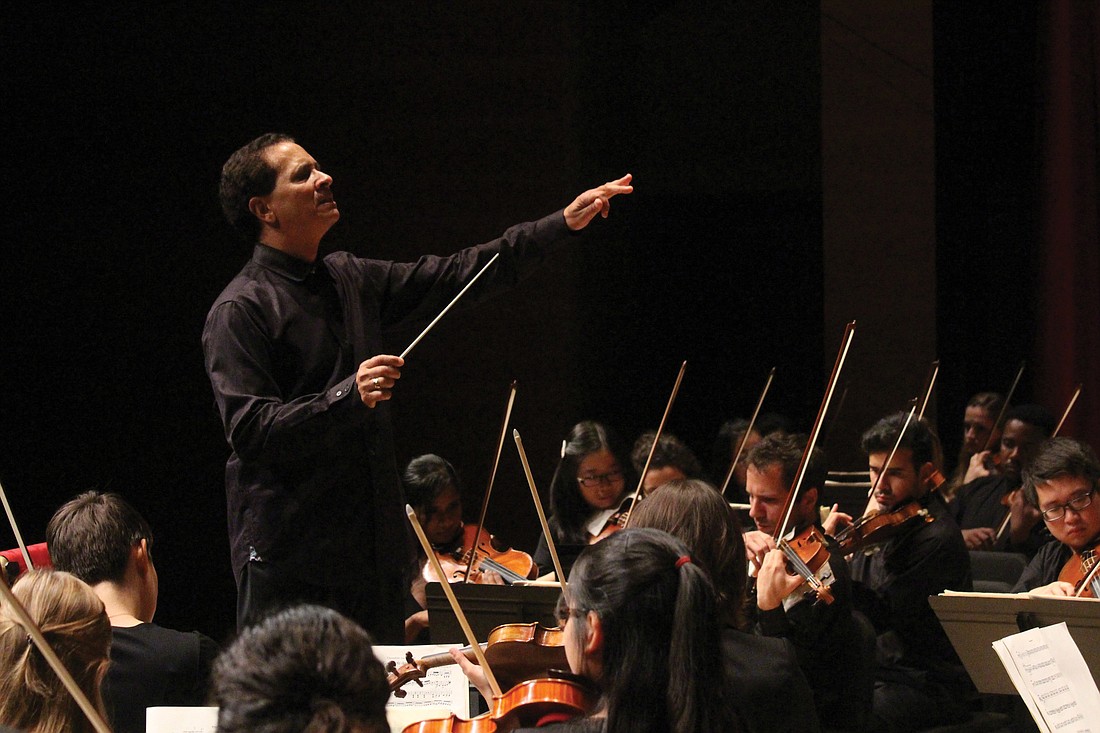- July 26, 2024
-
-
Loading

Loading

Last year the Sarasota Orchestra launched the “Discoveries” series at the Sarasota Opera House, presenting concerts of somewhat unfamiliar music in a 90-minute, no-intermission format at a late afternoon time. The capacity audiences have proved the efficacy of this idea, and there was a great deal to discover at last Sunday’s concert.
First was the conductor, Guillermo Figueroa, who was also the violin soloist, with that wonderful program of "Music of the Americas." The program featured mostly the strings of the orchestra. Second was Principal Clarinetist Bharat Chandra, soloist in the Copland Clarinet Concerto.
Figueroa is well-known as a violinist, co-founder and former concertmaster of the Orpheus Chamber Orchestra, an orchestral cooperative playing without a conductor. He is currently conductor of the Santa Fe Symphony and guest conductor and soloist with many orchestras.
Composer Ernesto Cordero is a friend of Figueroa’s, who liked two of his compositions so much, he decided to blend them together to make one Concerto for Violin and Strings. The “Insula tropical” uses a reduced string orchestra, all standing but the cellos and basses, and Figueroa was both soloist and leader.
The work opens with strong rhythmic ostinato chords from the strings, with the soloist leading and keeping the pace up throughout. Figueroa is a strong violinist, with a big sound and solid technique. After an electrifying cadenza passage, the thick string chords of the second movement provided a lush background for a beautiful latin melody, leading to a rather jazzy third movement and a perpetual motion finale. It was really chamber music of the highest order.
Osvaldo Golijov’s “Last Round” had the standing strings divided into two groups enhancing the antiphonal effect, almost like finishing one another’s sentences in speech. Contrasting with the Cordero, Golijov’s writing seemed harsh at first, with the second movement more tango-like, but with melodies distorted just a bit here and there. Again we heard closely-voiced dense chords in slightly dissonant harmonies, yet the Latin feeling was always present.
Chandra’s performance of Copland’s Clarinet Concerto literally “stopped the show” in its outstanding display of virtuosity and musicality. Written on a commission from jazz artist Benny Goodman, Copland’s first movement is a series of lovely melodies much in the vocabulary of his “Appalachian Spring” ballet. They also reminded me so much of the early writings of Leonard Bernstein, who had indeed studied with Copland early on.
In the long cadenza that joined the two movements, Chandra moved slowly about the stage, a contemplative and improvising Pied Piper, bringing all of us along with every note.
The final movement was a jazzy romp with some interesting interplay with the orchestra of strings. At the end the audience leapt to their feet with bravos and applause.
This ovation helped create the mood for the final work, Ginastera’s “Variaciones concertantes,” a virtual showcase for the orchestra. The theme was first stated by Natalie Helm, cello and Katherine Siochi, harp, singing forth the beautiful melody, which was then shared and transformed throughout the orchestra in some 11 variations. These variations highlighted the playing of each of the principal players, and galvanized by violist Steve Laraia’s virtuoso variation, before returning to the original theme, played this time by principal bass John Miller in an exquisite solo style. The finale was a rousing athletic movement in the style of a rondo, bringing the concert to an explosive end.
Next season, “Discoveries” will be suspended in favor of “Discovering Beethoven,” two concerts in commemoration of the 250th anniversary of the composer’s birth. I, for one, look forward to the return of the originally themed “Discoveries” in the following season.